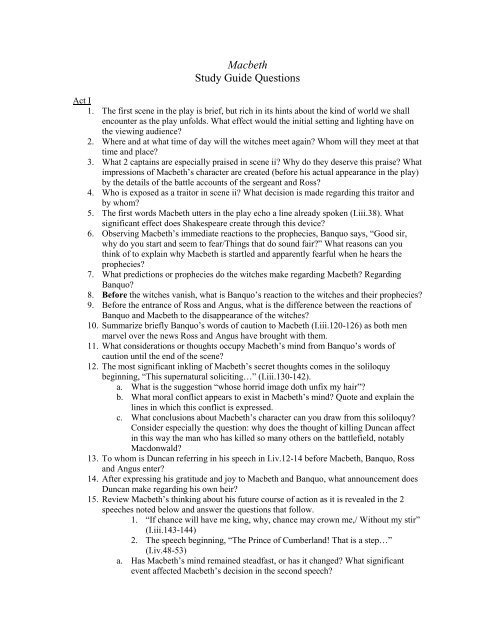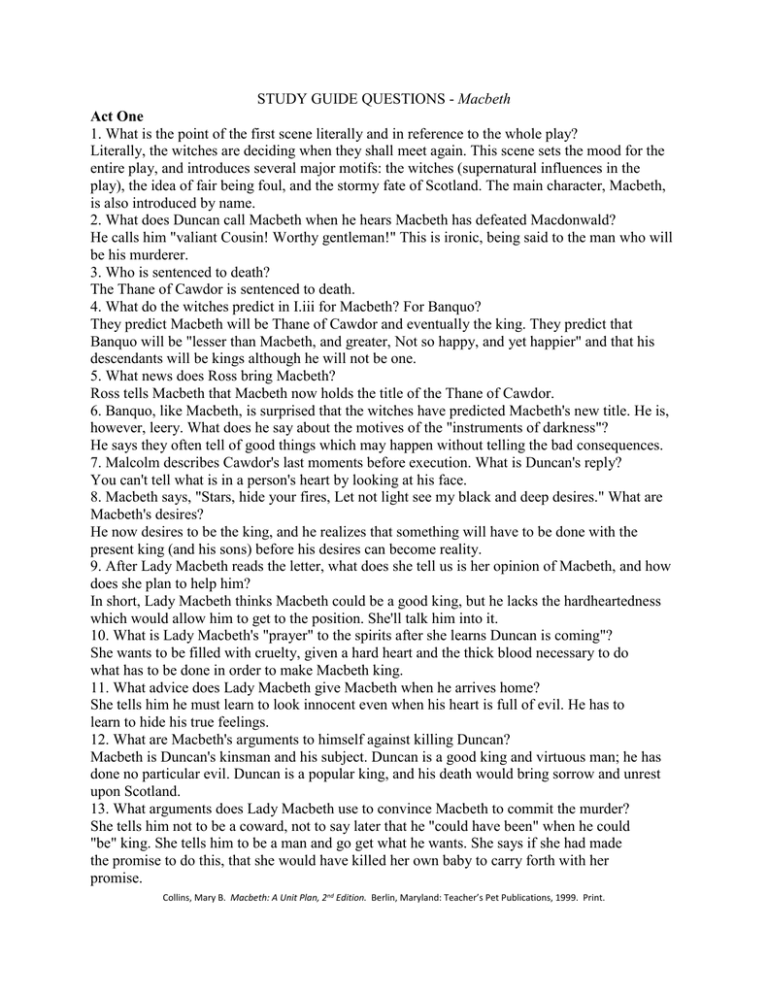The witches’ prophecy has planted a seed of ambition in Macbeth’s mind, and in Act 2 of Shakespeare’s Macbeth, that seed begins to sprout. The play takes a dark turn as Macbeth, driven by ambition and Lady Macbeth’s relentless urging, commits regicide. This act is full of suspense and psychological tension, prompting readers and viewers to consider the moral implications of ambition, the power of suggestion, and the consequences of unchecked desire.

Image: deborahsilvermusic.com
Exploring Act 2 through the lens of critical thinking and careful analysis is essential to understanding the play’s deeper themes and complexities. Through careful examination of the text, readers can gain a deeper understanding of the characters’ motivations, the significance of key events, and the play’s overall message. By delving into the questions posed in this study guide, you can unlock a richer understanding of this impactful and unforgettable act.
The Seeds of Ambition and Murder
1. The Weight of the Prophecy
The witches’ prophecy, “Thou shalt be king, hereafter,” has been a constant presence in Macbeth’s thoughts since he first heard it. How does this prophecy influence Macbeth’s actions in Act 2? Is he motivated by ambition, a desire for power, or both? How has the prophecy affected his mental state, and do you think he would have considered murder without the witches’ influence?
To answer these questions, consider Macbeth’s soliloquies, particularly those where he contemplates the murder of Duncan. Look for phrases that reveal his internal struggle, the arguments he makes both for and against the crime, and the role the prophecy plays in his decision-making process.
2. Lady Macbeth’s Role
Lady Macbeth is a complex and ambitious character who exerts considerable influence over her husband. How does she contribute to Macbeth’s decision to kill Duncan? Analyze her interactions with Macbeth, her language, and her actions to understand what motivates her to encourage this heinous act.
Consider Lady Macbeth’s infamous “unsex me here” speech. How does this speech demonstrate her character? What is her view of manhood and femininity, and how does she utilize these concepts to manipulate Macbeth? How does her manipulation and influence represent the power dynamic in their relationship?

Image: studylib.net
3. Murder and Guilt
Macbeth is plagued by guilt after killing Duncan. How is his guilt manifested, and how does it impact his behavior? Compare his reaction to the murder with Lady Macbeth’s reaction. Do they share the same feelings about the act, or are their responses different?
Consider Macbeth’s hallucinations and nightmares in Act 2. What do these visions reveal about his psychological state? How do his fears and anxieties connect to the guilt he experiences? How does Shakespeare use imagery to convey the moral consequences of Macbeth’s actions?
The Impact of Act 2
Shakespeare uses Act 2 to move the play toward its climax by establishing the consequences of Macbeth’s ambition. The murder of Duncan initiates a chain of events that leads to further violence, betrayal, and ultimately, tragedy. How does Act 2 lay the groundwork for the ensuing events? What do we learn about the characters and their motives at this point in the play?
To answer these questions, consider how Act 2 develops the characters and their relationships. How do the roles of Macbeth and Lady Macbeth change, and what does this tell us about their ambitions, their capacity for violence, and their vulnerability? How does the murder of Duncan impact the atmosphere of the play, and how does it set the stage for the struggles and conflicts to come?
Act 2 delves into the themes of ambition, morality, and the destructiveness of evil. Through Macbeth’s actions, Shakespeare explores the dark consequences of pursuing power at any cost. The questions posed in this study guide can help you unpack these themes and analyze the complex characters and events that drive the narrative. By engaging with the text and asking critical questions, you can unlock a deeper understanding of this compelling and enduring play.
Tips and Expert Advice
Analyzing Shakespeare can be demanding, but by approaching Act 2 with a structured method, you can decipher the complexities and enjoy a richer understanding of the work. Here are a few additional tips to enhance your study of Macbeth:
- Focus on the themes: Identify the key themes of Act 2, such as ambition, guilt, and the nature of power. Look for examples of these themes in the characters’ words, actions, and interactions.
- Read between the lines: Pay attention to the nuances of language, such as metaphors, similes, and imagery. How does Shakespeare use these literary devices to convey the characters’ emotions, motivations, and the atmosphere of the scene?
- Consider the historical context: Research the historical period in which Shakespeare wrote the play. How do the political and social conditions of the era influence the play’s themes and characters?
- Explore different interpretations: Read scholarly articles, watch film adaptations, and engage in discussions about Macbeth. How do others interpret the play, and how do these interpretations compare to your own understanding?
By following these tips, you can gain a deeper understanding of Act 2 and its significance within the larger context of Macbeth as a whole. Through critical analysis, exploration of themes, and attention to literary devices, you can unlock the play’s depths and appreciate its enduring power.
FAQ
Here are some frequently asked questions related to Act 2 of Macbeth:
Q: What is the significance of the dagger scene?
A: The dagger scene is a pivotal moment where Macbeth visualizes a dagger, suggesting the murderous thoughts and anxieties brewing within him. This hallucination symbolizes his struggle with guilt and the potential consequences of his actions.
Q: How does Lady Macbeth react to the murder?
A: While Macbeth is plagued by guilt and hallucinations, Lady Macbeth initially appears more resolute and calm. However, her attempts to control her emotions also demonstrate the inner turmoil and fear that she too experiences, though perhaps in a more controlled way.
Q: What are the key themes of Act 2?
A: Act 2 explores the consequences of unchecked ambition, the corrosive power of guilt, the influence of power on morality, and the destructive nature of evil.
Study Guide Questions Macbeth Act 2
https://youtube.com/watch?v=bS19lm2_GPE
Conclusion
Act 2 of Macbeth is a turning point in the play, setting the stage for the unfolding tragedy that follows. Through careful analysis of Macbeth’s internal struggles, Lady Macbeth’s manipulation, and the consequences of their actions, you can gain a deeper understanding of this powerful and complex act. By examining the key questions, themes, and literary devices within Act 2, you can unlock a richer understanding of this enduring Shakespearean masterpiece.
Are you interested in learning more about Shakespeare’s Macbeth? Do you have any other questions or insights you’d like to share about Act 2?






